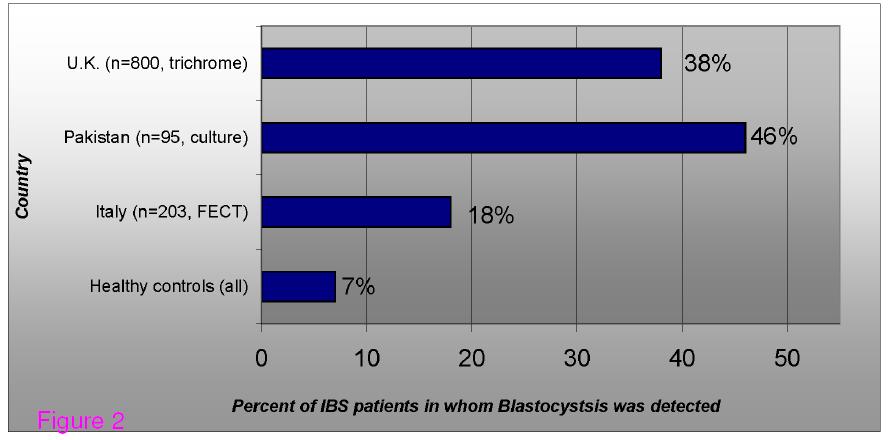It has been known for some time that bacterial overgrowth is a common cause/aggravation of irritable bowel. Now further concern Blastocystis Hominis and Dientamoeba fragilis infections are not being reported because labs are restricting their search for Amoebiasis and Giardiasis – but only with one stool which is suboptimal. Parasit Vectors. 2008 Oct 21;1(1):40. [Epub ahead of print] Oh my aching gut: irritable bowel syndrome, Blastocystis, and asymptomatic infection. Boorom KF, Smith H, Nimri L, Viscogliosi E, Spanakos G, Parkar U, Li LH, Zhou XN, Ok UZ, Leelayoova S, Jones MS
abstract
free article – well worth reading
- Like Helicobacter pylori and ulcers, B. hominis can exist asymptomatically
- There are outbreaks treated in the literature
- Its presence is more common in symtomatic cases:

It appeared a couple of California doctors made a name for themselves claiming another unknown agent was responsible for problems in Blastocystis hominis cases while more sophisticated international studies clearly showed a connection.
Our Regina General Hospital community lab will only check for Ameoba and Giardia on ONE sample and does not mention B. hominis. I hope the hospital certification committee is aware how slack they have become. Also, they no longer do stools for leukocytes – present in 1/2 of microscopic colitis cases and often the only finding.
“Objections notwithstanding, the clinical community has diagnosed and treated the infection frequently since then [6, 10-12], although the research community describes Blastocystis pathogenicity as controversial [13]. Blastocystis is now by far the most prevalent mono-infection in symptomatic patients in the United States [14] and was found 28.5 times more often than Giardia lamblia as a mono-infection in symptomatic patients in a 2000 study [14].”
Immune activation is seen in Irritable bowel:
Gastroenterology. 2007 Mar;132(3):913-20. Epub 2007 Jan 26. Comment in: Curr Gastroenterol Rep. 2007 Oct;9(5):363-4. Immune activation in patients with irritable bowel syndrome. Liebregts T, Adam B, Bredack C, Röth A, Heinzel S, Lester S, Downie-Doyle S, Smith E, Drew P, Talley NJ, Holtmann G.
abstract
I am left with wondering how I am going to diagnose this condition or should I just let these people continue having their “aching guts”.
